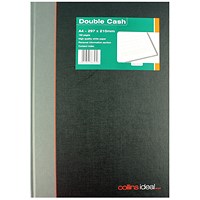Accounts Books, Payroll Books and Petty Cash Books
Businesses use account books to document how money circulates, including what is bought, the taxes and salaries paid out, as well as profits.
Here at Paperstone you will find account books by renowned stationery brands such as Cathedral, Guildhall and 5 Star. This includes the iconic Cathedral 69 and 150 series, as well as the Guildhall 31 series.
Account books are further categorised into:
- Salary and wage books which can be used to document pay and tax for staff, overtime, pension schemes, statutory sickness and maternity leave.
- Petty cash books and cash receipts – for recording small purchases.
Each brand has a unique style, and books with templates suitable for specific tasks. On our website we offer account books with as little as two columns and as many as 27.
When buying account books, you must also consider the size, colour and binding style of book you will need.
Account books range for 297x315mm, which are easy to hold in your hand, to A4 pads which are larger and allow for more detailed documentation.
Our wide range of account books come with card, hardcover, and soft covers. Card covers are lighter than the other types and are therefore more portable, but aren’t as resilient.
The binding is also an important factor when picking an account book. Casebound books are the most difficult to tamper with, and are great for archiving; whereas pages are easy to remove from gummed, ring-bound or loose-sheeted accounting pads.
Account books glossary
- Accounts books. Books used to record personal or commercial accounts.
- Analysis pads. provide a simple and effective way of collating and organising financial records.
- Cash books. For recording all types of cash transactions.
- Cash columns. Number of columns to record data per page or per opening.
- Wages books. For recording wages and salaries
Help with your company accounts
- UK government-provided Business Link offers free advice to businesses of all sizes on all aspects of starting up and running a business. In particular it offers advice to tax agents, accountants and advisers acting on behalf of a company.
- The HM Revenue & Customs website covers provides all information on tax that an employer will need to know.
Accountancy – Did you know...?
"In the name of God enter in the Journal the first item of your Inventory which is the quantity of money that you possess." – Luca Pacioli (1494)
- Tuscan-born maths bod and Franciscan friar Luca Pacioli is popularly (we use the word advisedly) considered the father of accounting, although he codified rather than invented the double-entry accounting system used by Venetian merchants during the Renaissance. In his 1494 Summa de arithmetica, geometria, proportioni et proportionalita, he outlines the practice of balancing debits and credits in the ledger, the accounts book.
- But evidence of accountancy has been unearthed by archaeologists from the most ancient remains of Jericho, “the oldest city on earth.” Seems like accountancy is just about as old as civilisation itself.
- The word “account” enters English from Old French, both as noun and verb, around 1300: “This child... Servede a burgeys of the toun, and his acountes wrot” (Life of Beket).
- In Mel Brooks' 1968 film The Producers Leo Bloom uses the term “creative accounting”. This pre-dates the Oxford English Dictionary's earliest citations (1973) for the term.
An accountancy joke
“Never call an accountant a credit to his profession; a good accountant is a debit to his profession.” – Sir Charles Lyell (American Accountant, 1797-1875)
Brilliant.











































